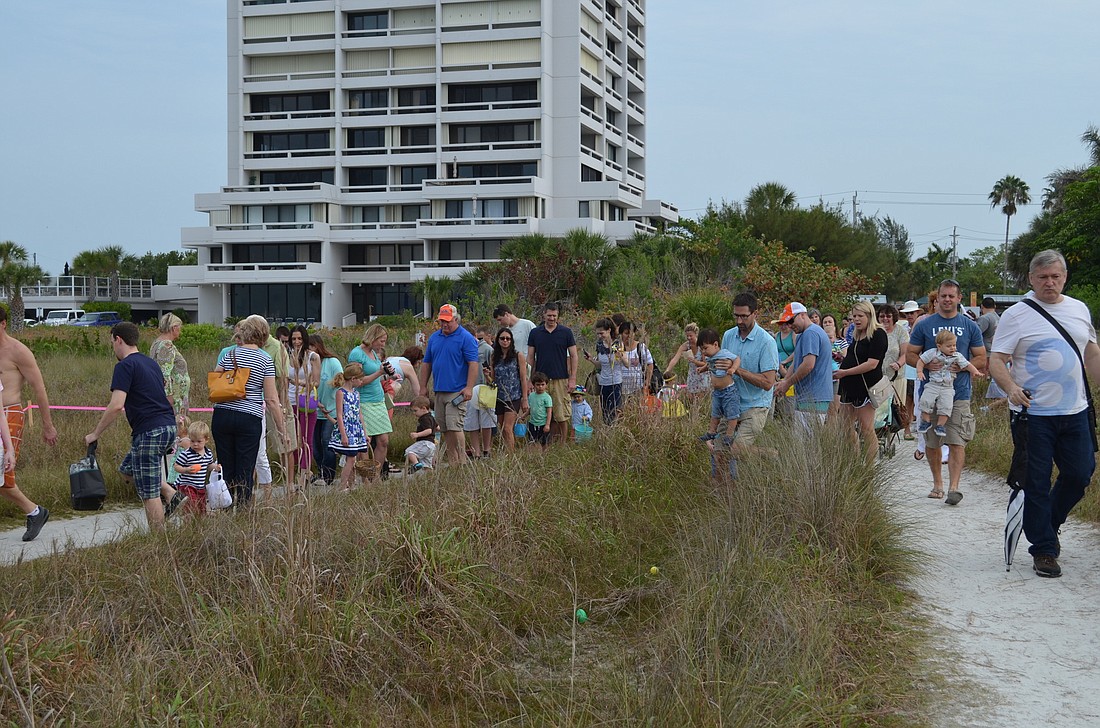- May 1, 2024
-
-
Loading

Loading

After all the eggs were collected for the Siesta Key Village Association's annual Easter Egg Hunt and the families headed home with baskets full of candy, a conversation began regarding whether the event can continue in its current form.
County staff saw advertisements for the 2016 event that listed a charge for participating — but organizers hadn't obtained a permit to host the Easter egg hunt in the Siesta Beach Access 5 parking lot.
“Generally, if you’re going to have an event, you can’t charge a fee to get in to the park without our approval,” said George Tatge, the county's manager of beaches.
During an April 5 meeting, SKVA Secretary Roz Hyman said she received a call from Sarasota County Parks, Recreation and Natural Resources staff following the Easter egg hunt. Officials shared their questions regarding the event, which they hoped to address as the organization works on planning next year's hunt.
“One of the concerns, of course, is that public access is maintained during the event,” Tatge said. “Another concern is the implications of the Easter egg hunt in the dunes.”
An estimated 200 children participated in this year’s festivities. The event included Easter egg hunts, face painting and visits with firefighters and the Sarasota County Sheriff’s Mounted Patrol unit. In Hyman's eyes, the holiday celebration went smoothly.
“For those of you who were at the Easter egg hunt, it was a fun time and everyone was happy with it,” Hyman said during the meeting.
SKVA vouched that the more than 1,000 plastic eggs used in the hunt were accounted for, placed in plain sight for easy visibility for the children that attended. Although there was a $10 registration fee for children to actually participate in the Easter egg hunt, members of the public were still allowed to walk through the event and access the beach.
The parking lot for the beach access, which Tatge estimates can hold at least 25 cars, was used from 9 a.m. to noon. Among Tatge's suggested solutions was moving the event to Beach Access 7, which he said was a better match and would also provide more space for the event.
“A few years ago we purchased a few lots adjacent to Access 7 that could be used for an event,” Tatge said. “We’ve bought the surrounding land and we can define Access 7 all the way out to the water. The other beach accesses are just right of ways with an easement.”
SKVA members are still attached to their traditional spot on Beach Access 5, located just south of the Village. One reason is environmental — as bird-nesting season begins, the Audubon Society suggested the use of Access 5 over Access 7. Access 5 was clear of any active nests this year, which typically appear on Siesta Key beaches as early as March 1.
The Audubon Society was a participant in this year's Easter egg hunt, setting up a booth to raise awareness regarding snowy plover nesting.
“On a beach like Siesta Key, because there are so many people who come to the beach, all of the people could cause a little extra stress for the birds,” said Holley Short, bird stewardship coordinator with Audubon Florida. “They aren’t quite ready to start nesting until the activity dies down.”
Tatge met with Hyman and SKVA Vice President Mark Smith Thursday, April 7 to discuss the event and necessary alterations if the Easter egg hunt is to continue in 2017. To hold the event next year, SKVA must satisfy a series of county regulations, such as obtaining a temporary use permit through the building department that comes with a $140 fee. The group would also need to get a park permit, which costs $49.50 per hour — though a non-profit discount can bring the price down to $33 per hour.
Although some questions remain, Tatge said the event's survival shouldn't be in any serious doubt.
“As long as they’re not blocking public access and we’ve got a way around the fee thing, if they can jump through all of the hoops for the process, then we could proceed with the event,” Tatge said.